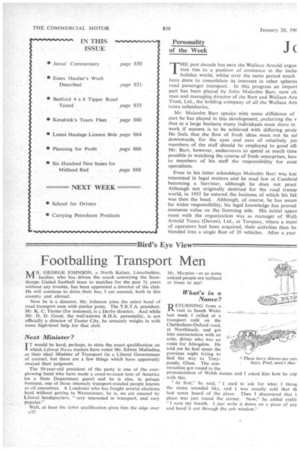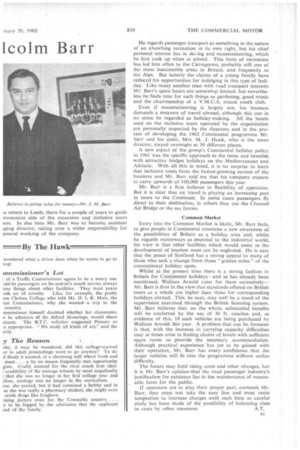J(
Page 34

Page 35

If you've noticed an error in this article please click here to report it so we can fix it.
leolm Barr
THE past decade has seen the Wallace Arnold organ ton rise to a position of eminence in the inclu: holiday world, whilst over the same period much been done to consolidate its interests in other spheres road passenger transport. In this progress an import part has been played by John Malcolm Barr, now ch man and managing director of the Barr and Wallace Am Trust, Ltd., the holding ccimpany of all the Wallace Am tours subsidiaries.
Mr. Malcolm Barr speaks with some diffidence of part he has played in this development, preferring the v that in a large business many individuals must share in work if success is to be achieved with differing proje He feels that the flow of fresh ideas must. not be sol downwards, for the eyes and ears of relatively jun members of the staff should be employed to good elf' Mr. Barr, however, endeavours to spend as much time possible in watching the course of fresh enterprises, leav to members of his staff the responsibility for exist operations.
Even in his latter schooldays Malcolm Barr was kce interested in legal matters and he read law at Cambrid becoming a barrister, although he does not pract Although not originally destined for the road transp world, in 1951 he entered the business of which his fat' was then the head. Although, of course, he has assun far wider responsibility, his legal knowledge has proved immense value on the licensing side. His initial appoi ment with the organization was as manager of Wall; Arnold Tours (Devon), Ltd., at Torquay, where a numl of operators had been acquired, their activities then be blended into a single fleet of 20 vehicles. After a year
:0 return to Leeds, there for a couple of years to guide 'remotion side of the excursion and inclusive tours iess. In due time Mr. Barr was to become assistant tging director, taking over a wider responsibility for ;eneral working of the company. He regards passenger transport as something in the nature of an absorbing recreation in its own right, but his chief personal interest lies in ski-jag and mountaineering, which he first took up when at school. This form of recreation has led him often to the Cairngorms, probably still one of the most inaccessible areas in Britain, and frequently to the Alps. But latterly the claims of a young family have reduced his opportunities for indulging in this type of holiday. Like many another than with road transport interests Mr. Barr's spare hours are somewhat limited, but nevertheless he finds time for such things as gardening, good music and the chairmanship of a Y.M.C.A. mixed youth club.
Even if mountaineering is largely out, his business demands a measure of travel abroad, although this can in no sense be regarded as holiday-making. All the hotels used on the inclusive tours operated by the organization arc personally inspected by the directors and in the process of developing the 1962 Continental programme Mr. Barr and his sister, Mrs. M. J. Hook, who is the tours director, stayed overnight at 30 different places.
A new aspect of the group's Continental holiday policy in 1961 was the specific approach to the teens and twenties with attractive budget holidays on the Mediterranean and Adriatic. With all this in mind, it is no surprise to learn that inclusive tours form the fastest-growing section of the business and Mr. Barr told me that his company expects to carry upwards of 100,000 passengers this year.
Mr. Barr is a firm believer in flexibility of operation. But it is clear that air travel is playing an increasing part in tours to the Continent. In some cases passengers fly direct to their destination, in others they use the Channel Air Bridge or the sea ferries.
Common Market
Entry into the Common Market is likely, Mr. Barr feels, to give people in Continental countries a new awareness of the possibilities of Britain as a holiday area and, whilst he regards motorways as essential to the industrial world, his view is that other facilities which would assist in the development of tourism must not be neglected. He is sure that the peace of Scotland has a strong appeal to many of those who seek a change from those "golden miles" of the conventional holiday spots.
Whilst at the present time there is a strong fashion in Britain for Continental holidays—and as has already been mentioned, Wallace Arnold cater for them extensively— Mr. Barr is firm in the view that standards offered on British tours as a whole are higher than those for corresponding holidays abroad. This, he says, may well be a result of the supervision exercised through the British licensing system. Mr. Barr believes that, on the whole, substantial benefits will be conferred by the use of 36 ft. coaches and, as evidence of this, 18 such vehicles are being purchased by Wallace Arnold this year. A problem that can be foreseen is that, with the increase in carrying capacity difficulties may at times arise in finding chains of hotels with sufficient spare room to provide the necessary accommodation. Although practical experience has yet to be gained with their operation, Mr. Barr has every confidence that the larger vehicles will fit into the programme without undue difficulty.
The future may hold rising costs and other changes, but it is Mr. Barr's opinion.that the road passenger industry's justification for existence lies in the maintenance of reasonable fares for the
If operators are to play their proper part, contends Mr. Barr, they must not take the easy line and must resist temptation to increase charges until such time as careful study has been made of the possibility of balancing rises
in costs by other measures. A.T.




















































































































